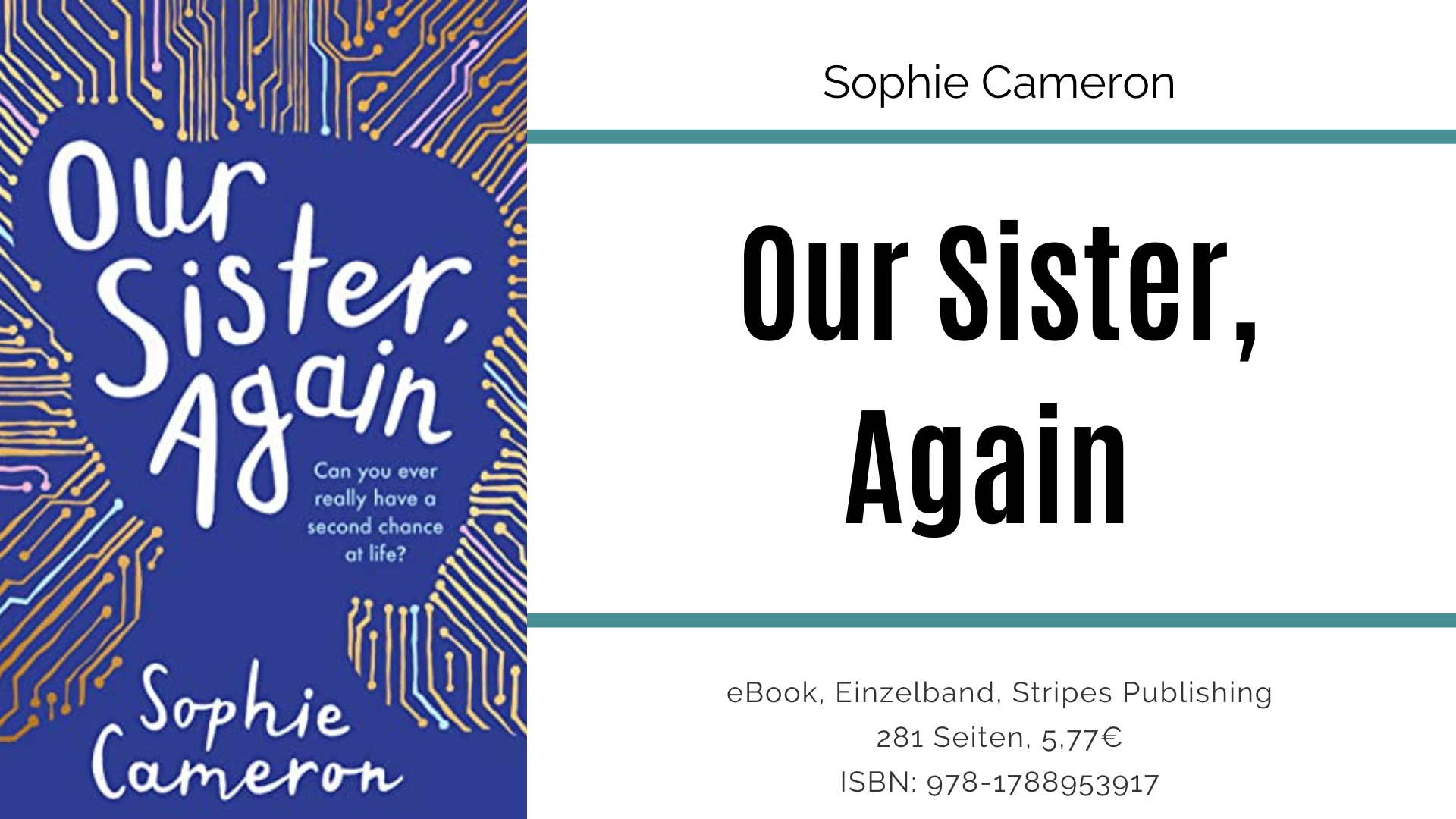On a small island off the Scottish coast, Isla and her family are grieving the loss of her older sister Flora, who died three years ago. Then they’re offered the chance to be part of a top-secret trial, which revives loved ones as fully lifelike AI robots using their digital footprint.
Isla has her doubts about Second Chances, but they evaporate the moment the ‘new’ Flora arrives. This girl is not some uncanny close likeness; she is Flora – a perfect replica. But not everyone on their island feels the same. And as the threats to Flora mount, she grows distant and more secretive. Will Isla be able to protect the new Flora and bring the community back together?
(Deutsche Version der Rezension weiter unten)
Lost and Returned
I got to know this book during my internship and was quickly taken by its premise. Therefore, it didn’t take me long to start it. And after few chapters, I was caught by the idea, the author’s writing style, even by the protagonists. Ilsa is torn between her own loss and grief and the aim to be strong and present for her family. She takes a step towards an organization who might be able to bring back her deceased sister – with that done, the story starts three years after her death.
The isolated setting on a Scottish island is immensely interesting, rich in culture, and enables the story to be as it is. We are stuck in a limited space with out protagonists which gives some thriller characteristics to the happenings. Isla and her friends must keep the experiment secret to not endanger it or the returned Flora. Nevertheless, the returnee does not seem to be as welcomed as first impressions make us think. The cozy and supporting community might break under this new development that is beneficial for one family and their closest friends – or isn’t it? The author knows how to take us to Eilean Dearg and presents us the welcoming culture of the highlands with Gaelic comments and sociable gatherings. She makes us feel at ease and at home but foreshadows threats and changes at once.
Flora is home, and it’s the most amazing thing in the world. I’m not going to let the mechanical stuff get in the way of appreciating that. Instead, I’m going to confront it head-on.
“Maybe you should stick to eating chips.” I poke Flora in the side. “Get it? Microchips.”
Flora blinks at me. For a moment I worry I’ve crossed a line but then she throws her head back and laughs.
“That’s so rubbish! That’s embarrassingly bad.”
Ùna bounces up on to her knees. “I’ve got one, I’ve got one! Make sure you take one byte at a time.”
“That’s even worse!”
More than tension, this book gifts us with a lot of emotions. We get acquainted with the new situation alongside Ilsa. Sophie Cameron gives us interesting and moving insights into their life before Flora’s death without too much preface but with outpointing changes and presenting memories. We fall in love with Isla’s family and enjoy their newly recovered, heartwarming dynamics. They openly and surprisingly do not shy away from issuing the whole “artificial intelligence” topic but rather talk through it. It even is the punch line to their joking as much as the core of Flora’s doubts.
I learned that normal can disappear with one doctor’s appointment. That forever can drift away like a cloud. That sometimes life is unfair, unfair in a way that doesn’t make sense, so unfair it hurts.
For Flora, those lessons were even sharper. I’m glad she can’t remember it, but at the same time it’s strange that she can’t. Even though she’s home now, losing her is a huge, important part of our family, something that reshaped us forever. I don’t know who we are without that any more.
Different opinions and ways of living are not convicted in this story. They also do not serve as conflict points. Besides the main story, our protagonist falls in love for the first time with her teammate Holly. Isla’s best friend Adhiti is crafty and interested in programming. Next to the representation of Gaelic and Scottish culture, I loved to see these character traits playing into the story but not being the story themselves. Moreover, I enjoyed how the three quite diverse sisters were harmonizing though and touched my heart by reconnecting after one of them was lost. Loss and love are surely the main motifs of this story that convinced and moved me on several levels.
Conclusion
A moving and entertaining story that questions the core of being human and presents the differences, highs, and lows of our identities. This book is tense and most likely a fun experience for younger and elder readers. It surprised and convinced me repeatedly.

Dieses Buch ist mir in meinem Praktikum in die Hände gefallen und hat mich schnell mit seiner Prämisse fasziniert. Deswegen dauerte es auch nicht lang bis ich es begonnen hatte. Und bereits nach dem ersten Kapitel war ich gefangen von der Idee, von dem Schreibstil, sogar bereits von unserer Protagonistin. Ilsa ist gefangen zwischen ihrem eigenen Verlust und ihrer Trauer, aber auch dem Willen, für ihre Familie da zu sein und ihnen allen zu helfen. So geht sie einen Schritt, der sie in Verbindung zu jener Organisation bringt, die ihre verstorbene Schwester drei Jahre später zu ihnen zurückbringen wird.
Das Setting ist abgeschottet und doch ungemein interessant und reich an Kultur.
Dass die Geschichte auf einer schottischen Insel spielt, macht die Handlung erst möglich. Mit unseren Protagonist*innen bewegen wir uns nur sehr geringfügig im Raum, was den auftretenden Ereignissen einen fast schon krimiartigen Anschein verleihen. Hinzu kommen die Geheimnisse, die Ilsa und ihre Vertrauten hüten müssen, um das Experiment nicht zu gefährden. Doch gefährdet scheint eher oder später vor allem Flora selbst, die offensichtlich nicht von allen auf der Insel akzeptiert wird. Eine kleine, zusammenhaltende Gemeinschaft könnte in sich zerbrechen, was enorm Spannung aufbaut. Die Autorin vermag es wunderbar, uns auf Eilean Dearg zu entführen und uns die Kultur der Highlander*innen mit Gaelischen Kommentaren und geselligen Zusammenkünften aufzuzeigen. Wir fühlen uns zugleich wohl und fiebern doch mit unseren Protagonist*innen der drohenden Gefahr entgegen.
Doch nicht nur Spannung, sondern auch Gefühl kommen hier nicht zu kurz.
Zuerst müssen wir uns mit unserer Protagonistin an die neue Situation gewöhnen. Sophie Cameron schafft es ohne viel Vorwort durch Islas Erinnerungen uns die Differenzen zwischen ihrem Leben vor und nach Floras Tod aufzuzeigen. Dennoch schließen wir die Familie und auch ihren neuesten Wieder-Zugang schnell ins Herz. Die Dynamik ist nicht immer ohne Stolpersteine, aber unerwartet offenherzig und rührend. Überrascht hat mich, wie niemand versucht hat, das Thema „Künstliche Intelligenz“ zu umgehen, wie ich es beinahe vermutet hatte. Stattdessen wird es zur Pointe in Witzen, zum Fokus ernster Gespräche, gar zum Kern von Floras Selbstzweifeln.
Diverse Meinungen und Lebensweisen werden hier nicht verurteilt, noch als Ausgangspunkt für Konflikte genommen.
Unsere Protagonistin entwickelt ganz hinreißende Gefühle für ihre Fußball-Kameradin Holly. Ilsas beste Freundin Adhiti hat es nicht nur faustdick hinter den Ohren, sondern auch im Kopf und fasziniert sogar mich mit ihrem riesigen Interesse und Können in Sachen Programmieren. Die drei Schwestern an sich sind recht verschieden und harmonisieren auf ihre Weise doch ganz wundervoll miteinander. Es war unterhaltsam, aber auch rührend, sie nach dem Verlust der ältesten von ihnen wieder zueinander finden und mit einander interagieren zu sehen. Trauer und Liebe sind wohl die Leitmotive dieses Buches, welches mich auf vielerlei Ebenen von sich überzeugt und zutiefst gerührt hat.
Fazit
Eine rührende und unterhaltsame Geschichte, welche den Kern des Menschseins hinterfragt und zugleich die vielen Unterschiede, Höhen und Tiefen in unseren Identitäten aufzeigt. Dieses Buch ist spannend und ein Lesevergnügen für jung und alt, welches mich vollkommen unerwartet, aber umso mehr von sich überzeugen konnte.

The author:
Sophie Cameron is a YA and MG author from the Scottish Highlands. She studied French and Comparative Literature at the University of Edinburgh and has a Postgraduate Certificate in Creative Writing from Newcastle University. Her debut novel OUT OF THE BLUE was nominated for the Carnegie Medal 2019. She lives in Spain with her family. Q

